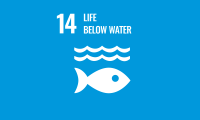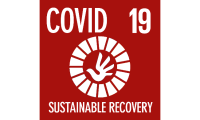SDG 14 and Sustainable Recovery

Key aspects of SDG 14:
1. Sustainably manage and protect marine and coastal ecosystems, restore fish stocks and prioritize access for small-scale fishers (targets 14.2, 14.4, 14.b)
The health of the ocean is tied to the health of all people and the planet. Marine environments urgently need breathing space in order to start to recover from decades of unsustainable use.
The protection measures taken by governments to contain the spread of the disease, while necessary, have impacted the entire seafood supply chain. Fishing activities have decreased in both artisanal and industrial sectors with implications, especially for the millions of people directly dependent on fishing for their livelihoods.
Sustainable recovery actions:
Ocean conservation and action should not come to a halt while tackling the COVID-19 pandemic. The pandemic offers an opportunity to start building a sustainable ocean economy to the benefit of all people, and with particular attention to protecting the rights of small-scale fishers whose livelihoods directly depend on ocean resources.
Concrete response and recovery measures that can help small-scale fishers include:
- Better access to loans and credit to allow small-scale fishers and processors (men and women) to invest in safe equipment and increase the local supply of fresh fish.
- Introduce or strengthen national and regional policy and regulation on the role and contribution of fisheries and aquaculture to food security.
- Support the development of safe local markets with decent work conditions.
- Include fishing communities in social protection programmes with a special focus on women.
- Blue economy development must follow a human rights-based approach.
- Seafood companies must identify and address human rights violations throughout their value chains.
- States must strengthen MCS fisheries standards to eradicate slavery and other gross human rights violations in fisheries and protect access rights of small-scale fishers by controlling illegal, unreported and unregulated fishing.
Visit the documents and resources listed in the “Key Human Rights Guidance” below for more information.
International Covenant on Economic, Social and Cultural Rights (ICESCR), 12.1: The States Parties to the present Covenant recognize the right of everyone to the enjoyment of the highest attainable standard of physical and mental health.
United Nations Declaration on the Rights of Indigenous Peoples (UNDRIP), art. 26.2: Indigenous peoples have the right to own, use, develop and control the lands, territories and resources that they possess by reason of traditional ownership or other traditional occupation or use, as well as those which they have otherwise acquired.
Declaration on the Rights of Peasants (UNDROP), art. 5.1: “Peasants and other people working in rural areas have the right to have access to and to use in a sustainable manner the natural resources present in their communities that are required to enjoy adequate living conditions, in accordance with article 28 of the present Declaration. They also have the right to participate in the management of these resources”.
Declaration on the Rights of Peasants (UNDROP), art. 20.1: States shall take appropriate measures, in accordance with their relevant international obligations, to prevent the depletion and ensure the conservation and sustainable use of biodiversity in order to promote and protect the full enjoyment of the rights of peasants and other people working in rural areas.
Declaration on the Rights of Peasants (UNDROP), art. 13.5: “States, taking into account the specific characteristics of peasant agriculture and small-scale fisheries, shall monitor compliance with labour legislation by allocating, where required, appropriate resources to ensuring the effective operation of labour inspectorates in rural areas”.
Key Human Rights Guidance
-
Enhancing accountability for small-scale fishers, Danish Institute for Human Rights, Report, 2020
-
COVID-19 materials from UNEP, United Nations Environment Programme, website
-
UN Guiding Principles on Human Rights and the Environment, Special Procedures, Report, 2018

